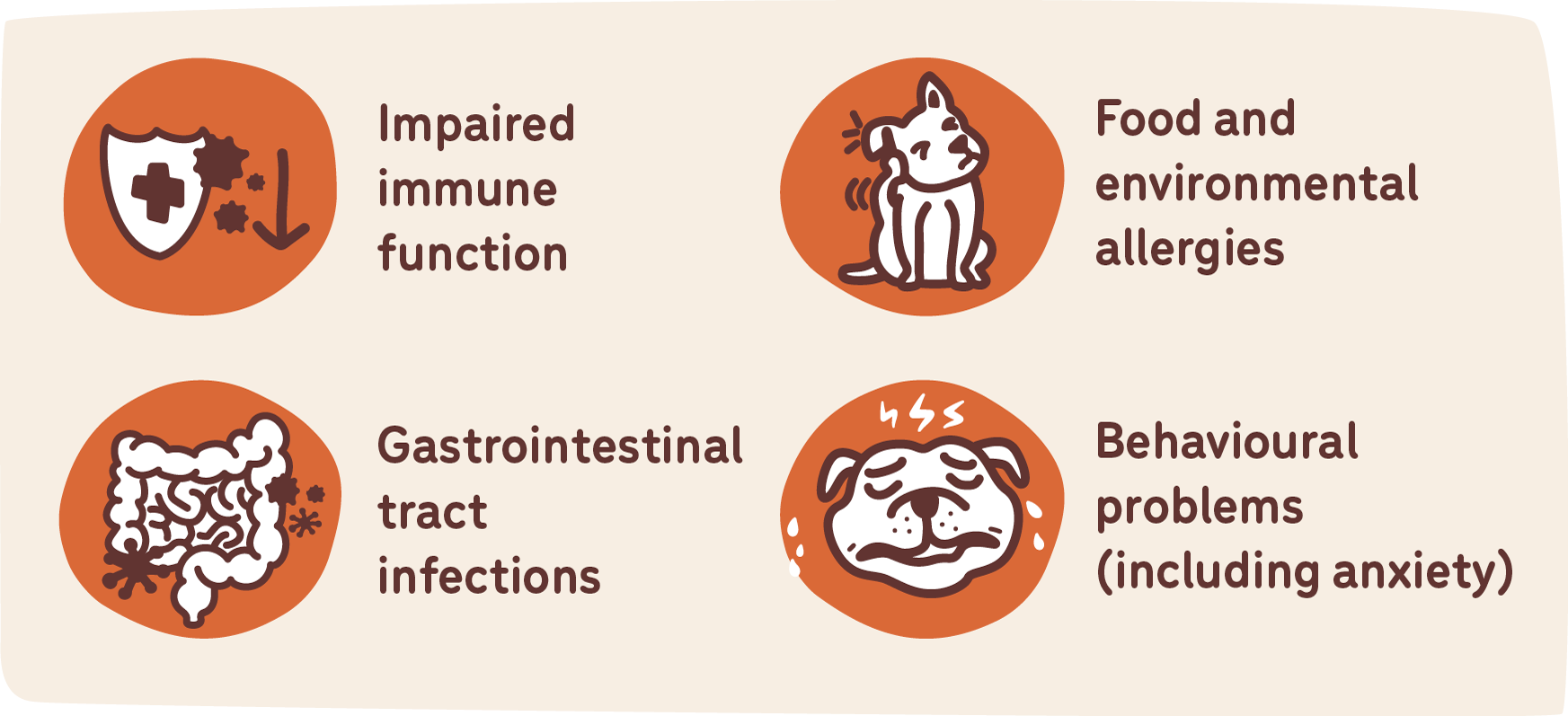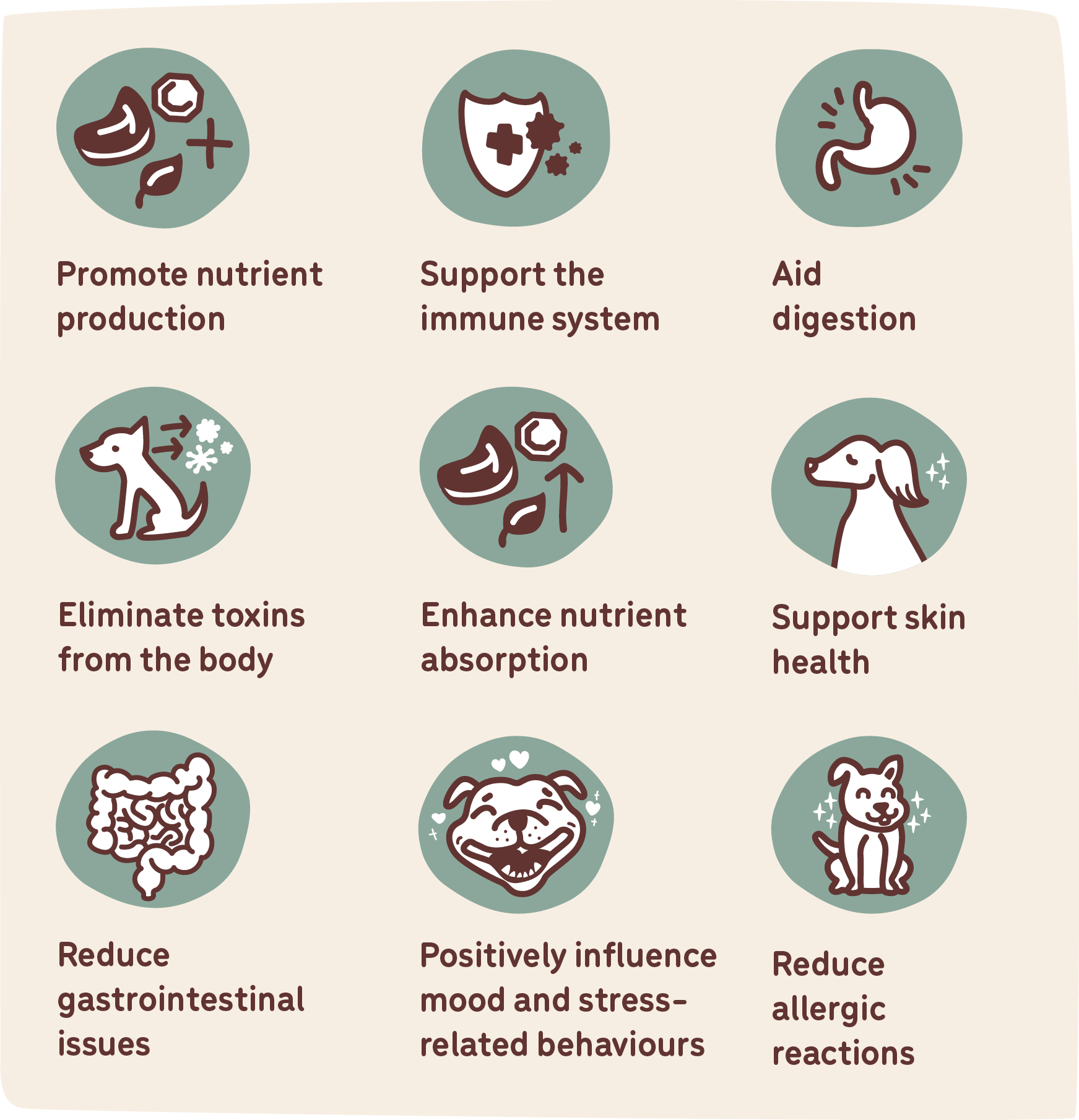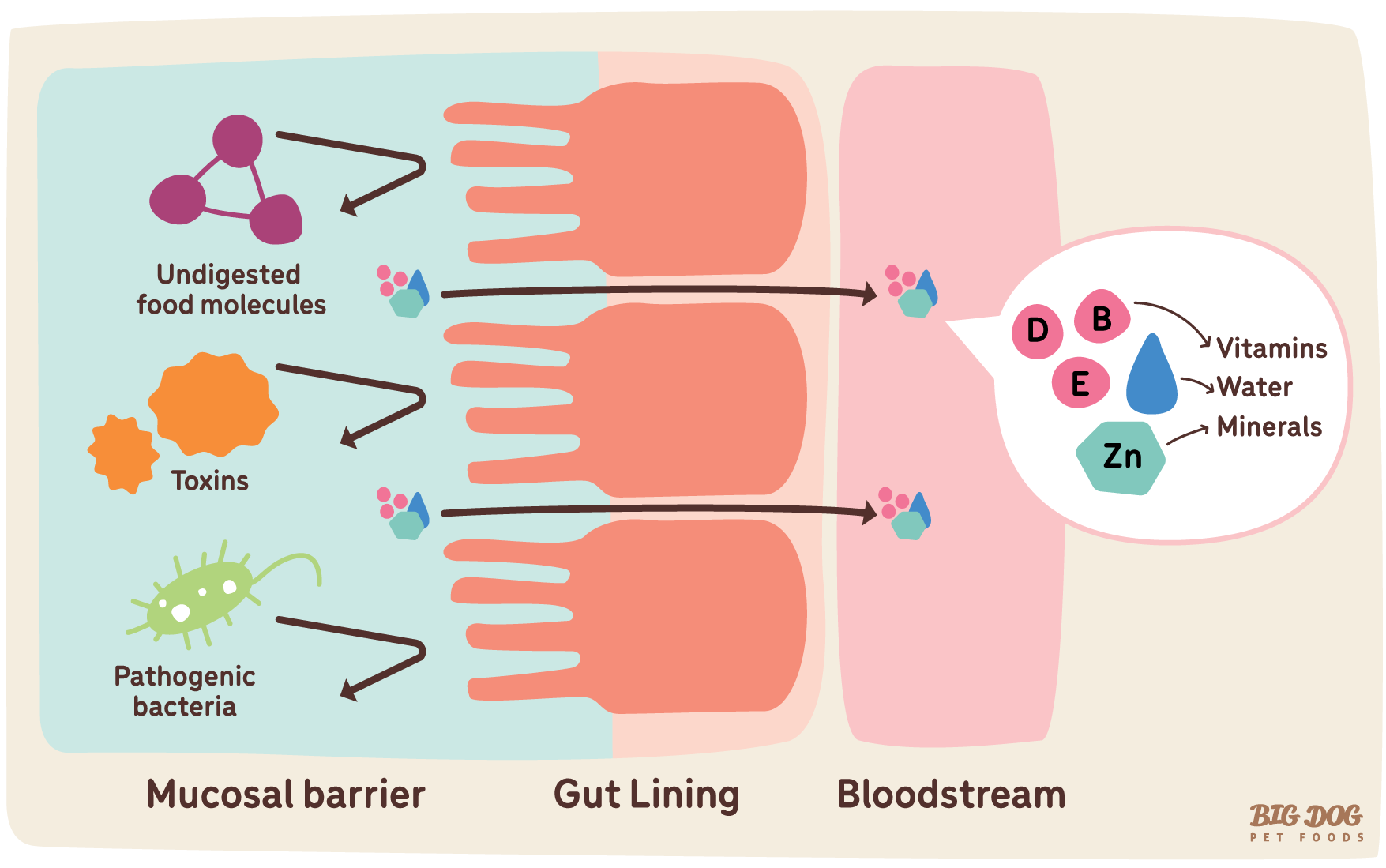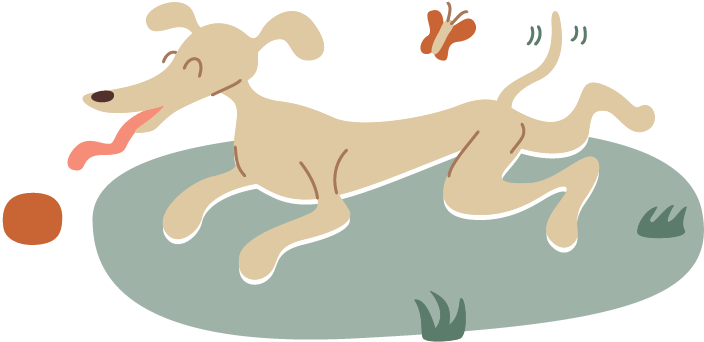The Health Benefits of Probiotics for Dogs

by Narelle Cooke, Canine Nutritionist
Over 2000 years ago Hippocrates stated that “all disease begins in the gut” – a concept that has well and truly stood the test of time. In the last few decades, research has started to catch up with this traditional wisdom and recognise that a healthy gut is largely responsible for good overall health for both us and our dogs. Unfortunately, just as gastrointestinal diseases are a major cause of illness in people,(1) poor digestive health also plagues many dogs, with the research showing that gastrointestinal problems are the primary reason for vet visits (2).
As a natural healthcare practitioner, I see the consequences of compromised digestion on a daily basis, along with the impact that this has on many other facets of health, including:

The great news is, that there is increasing scientific evidence to support the incorporation of (live beneficial bacteria and yeasts) into our dogs’ diets as a means to derive a wide range of health benefits. For example, studies show that probiotics can help to:

The critical importance of gut barrier function
One of the main mechanisms by which probiotics are able to deliver such amazing health benefits is due to their positive impact on the gut lining. By strengthening the mucosal barrier, it reduces the transfer of toxic compounds into the dog’s body and promotes stronger immune function. A healthy gut barrier also supports increased mucosal antibody production which helps to protect against infection, and also acts to suppress the growth of potentially pathogenic bacteria.
Conversely, any disturbance of gut barrier integrity can lead to increased permeability – aka ‘Leaky Gut’. This results in bacterial endotoxins, insufficiently digested food particles, and other immunomodulatory components entering more easily into the blood stream, where they are linked with an increase in various systemic inflammatory disorders (3). Unfortunately, many common dietary and lifestyle factors that our dogs are exposed to are known to cause leaky gut and damage our dog’s resident microbiota. Key examples include:
• Acid-lowering medications such as proton-pump inhibitors, antacids and histamine-2-antagonists. Such drugs are consistently linked with profound changes in the gut microbiota (4). They have also been associated with an increased risk of enteric infections (5,6).
• Anti-inflammatory medications such as non-steroidal anti-inflammatory drugs, which are a common causes of acute gastric erosion and chronic gastric ulceration (7).
• Antibiotics which cause rapid and significant drops in microbial numbers and diversity, the effects of which can persist for months or even years. Beyond increasing the immediate risk for infection, microbiota alterations caused by antibiotics can also affect basic immune balance with long-term repercussions (8).

The beneficial role of spore-forming bacteria – the new kids on the block!
Throughout history, human beings have consumed spore-based probiotics through the ingestion of raw vegetables and fermented foods that are contaminated with soil microflora. Unlike most traditional probiotics, which are similar to those found naturally in the gastrointestinal tract, spore-based probiotics derived from Bacillus species are among the most widespread microorganisms in nature and are able to grow under extreme environmental conditions such as high temperatures, high humidity, extreme drying and different types of radiation. Such resilient properties also allow them to resist those aspects of the body that are naturally designed to have an anti-microbial effect, such as gastric acid, pancreatic enzymes, and bile. Such robustness of spore-forming bacteria results in a greater number of spores reaching their destination in the intestines, where they then revert to active, growing bacteria that have been shown to support health in several ways.
Recent studies on Bacillus subtilis highlight its numerous health benefits (9-17).
Why increased diversity is key
It has been said that 'the whole is greater than the sum of its parts', and this is especially true of probiotics, where the functional role of the bacterial community is often more important than the individual components. Research investigating a wide range of disorders (including irritable bowel syndrome, diarrhoea, atopic disease – which may manifest as itchy skin and allergies in our pets, immune function, respiratory tract infections, and inflammatory bowel disease) has demonstrated that multi-strain probiotics confer greater efficacy than probiotics that contain only single strains.
And just as different types of microorganisms can cause different types of illnesses, different types of probiotics have different positive effects on a dog’s body. For example, other beneficial probiotic species to include in your dogs’ daily routine include (18-27):
Probiotic supplement or probiotic-rich food – which to choose?
Both probiotic supplements and probiotic-rich foods can be highly beneficial to overall health and are great additions to our dog’s diets, but I often get asked if one is better than the other.
The World Health Organization defines probiotics as “live microorganisms which when administered in adequate amounts confer a health benefit on the host”. Therefore, in order to be labelled a probiotic, there needs to be documented scientific evidence for the health benefit – which is where probiotic supplements and probiotic-rich foods tend to differ the most. But to help shed further light on the matter, lets’ look at some key advantages and disadvantages of each.
Probiotic Supplements
Probiotic-rich Foods
Quick decision-making checklist
While many situations support the use of both probiotic supplements and probiotic-rich foods at the same time, the table below highlights those instances in which a probiotic supplement should take priority in the support of your dog.
If your dog is currently healthy, you might consider including probiotics in the diet intermittently. For example, administer every few days as a means to give their gastrointestinal and immune systems a healthy boost. And if your dog has a condition noted above that may benefit from probiotic use, consider administering probiotics daily for at least 8 weeks while continuing to monitor their symptoms.
Summary

Imbalanced gut microflora (often referred to as ‘dysbiosis’), disrupts overall health and wellness. There is growing evidence to support the use of probiotics for both dogs and cats. Giving your pet healthy bacteria may positively influence chronic gastro-intestinal conditions such as IBS and IBD, obesity, liver disease, dental disease and behavioural disorders. A daily probiotic supplement may also provide additional benefits, such as improved appearance and quality of the skin and coat, a reduction in intestinal gas, improved breath, a reduction of allergies and in yeast-associated disorders, and improvements in bowel regularity and consistency.
Probiotics are generally considered safe for dogs and usually don’t cause any side-effects. But as every dog is created differently, always monitor your dog when starting them on anything new.
Check out Big Dog's range of probiotics for pets.
About the Author - Narelle Cooke, Canine Nutritionist.

Narelle is a clinical Naturopath, Nutritionist and Herbalist for both people and pets, and operates her wellness clinic ‘Natural Health and Nutrition’ in Dural, Sydney.
Being a lifelong dog-owner and currently meeting the demands of three French Bulldogs, two German Shepherds and a Burmese cat, Narelle is as passionate about the health and wellbeing of our pets as she is about their owners. And it was this strong desire to see her own pets live their longest and best lives that led her to hours of personal research and additional study in the area of natural animal health and nutrition.
· Bachelor of Health Science(Naturopathy) (ACNT)
· Bachelor of Agricultural Science (honours) (The University of Melbourne)
· Advanced Diploma of Naturopathy (AIAS)
· Advanced Diploma of Nutritional Medicine (AIAS)
· Advanced Diploma of Western Herbal Medicine (AIAS)
· Certificate III in Dog Behaviour and Training (NDTF)
· Certificate in Natural Animal Nutrition (CIVT)
· Certificate in Animal Nutrition (HATO)
